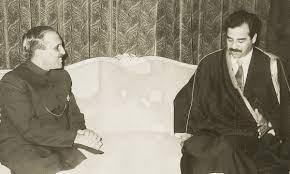For nearly seven decades, the Palestine-Israel conflict has largely been viewed as a struggle between Palestinians and the Israeli military.
But almost 55 years ago, Palestinian fighters seeking independence also found themselves at war with another Muslim country—Jordan. That conflict resulted in heavy casualties for Palestinians.
What many may not know is that during this war, a Pakistani military officer played an important role. That officer was General Zia-ul-Haq, who would later become Pakistan’s military ruler.
The war, fought from 16 to 27 September 1970, is remembered in history as “Black September.”
Over the years, scholars have written that King Hussein of Jordan received decisive military advice from Zia-ul-Haq, which enabled the Jordanian army to secure victory.
What Was Zia-ul-Haq Doing in Jordan in 1970?
After the 1967 Six-Day War, which Israel won, tensions remained high in the region. Jordan, along with Egypt and Syria, suffered heavy territorial losses—losing Jerusalem, Gaza, and the West Bank.
Meanwhile, Palestinian guerrilla groups set up bases along the West Bank border and launched attacks on Israeli-held areas. Their popularity grew, gaining support from Syria and Iraq.
Alarmed by this, King Hussein of Jordan sought help from his Pakistani friend, Brigadier Zia-ul-Haq, who was then serving as Pakistan’s Defense Attaché at its embassy in Oman.
According to author Tariq Ali in The Duel, Zia had been posted to Jordan after returning from training in the U.S., with the mission of strengthening Pakistan-Jordan military ties and reporting back to Pakistan.
Former CIA official Bruce Riedel confirms this in his book What We Won, writing that Zia had been in Jordan for three years before Black September, tasked with fostering ties and monitoring developments.
Zia’s Advice and Jordan’s Victory
But Zia’s role went beyond reporting. CIA officer Jack O’Connell, in his memoir King’s Counsel, wrote that when Syrian tanks entered Jordan in 1970 and the U.S. did not respond, King Hussein grew desperate.
He turned to Zia-ul-Haq, asking him to visit the Syrian border and assess the situation.
Zia reportedly told Jordanian officials the situation was “very bad.” He then advised King Hussein to deploy Jordan’s air force against Syrian forces.
According to Riedel, “That was the decision that allowed Jordan to win the war.”
Prince Hassan bin Talal, King Hussein’s brother and crown prince at the time, later confirmed Zia’s crucial role in an interview with Riedel in 2010.
Zia’s Promotion Backed by King Hussein
Riedel notes that Zia’s actions angered some Pakistani officials, since he had effectively participated in Jordan’s war—violating diplomatic orders.
But Jordan’s royal family was grateful. King Hussein personally recommended Zia to Pakistan’s new Prime Minister Zulfikar Ali Bhutto, praising his services during Black September.
As a result, Zia was promoted from Brigadier to Major General—a crucial step in his rise to power.
Raja Anwar, Bhutto’s former advisor, later wrote in The Terrorist Prince that had King Hussein not recommended Zia, his military career might have ended at the brigadier rank.
Was Zia Directly Involved in the “Black September Massacre”?
Officially, the war lasted from 16 to 27 September 1970, though clashes continued into the following year.
According to analysts, including Bruce Riedel, 3,000–4,000 Palestinians were killed, along with 600 Syrian soldiers and 537 Jordanian soldiers.
However, Palestinian leader Yasser Arafat claimed the toll was far higher—between 20,000 to 25,000 Palestinians.
Pakistani officials have historically supported the Palestinian cause, opposing Israel diplomatically. But some historians argue that Zia’s role in Jordan contradicted that stance.
Israeli general Moshe Dayan once remarked:
“King Hussein killed more Palestinians in 11 days than Israel did in 25 years.”
Indian historian Vijay Prashad also wrote in 2002 that with Zia’s help, King Hussein unleashed a massacre so severe that “its count was impossible.”
The Alternate View: Zia Only Provided Training
A different perspective came from former Pakistani diplomat Tayyab Siddiqui, who was stationed in Jordan during September 1970.
Writing in The News in 2010, Siddiqui said Pakistan had indeed sent around 20 senior officers to Jordan, Syria, and Iraq to provide training after the 1967 war.
The mission was not to fight, but to train Jordan’s forces.
Siddiqui recalled that on 2 September 1970, Zia phoned him, saying King Hussein had asked him to lead a Jordanian division near Irbid after the commander fled.
He immediately informed Pakistan’s defense secretary, who approved.
According to Siddiqui, before any operations began, Syria withdrew under U.S. and Israeli pressure.
Thus, Zia’s role in the alleged massacre was limited to command presence and training, not direct fighting.
The Controversy Around Zia’s Role
Despite these accounts, many continue to believe Zia personally oversaw operations in which thousands of Palestinians were killed.
Some even claimed that Yasser Arafat vowed never to visit Pakistan because of Zia’s involvement.
But Siddiqui dismissed this, noting that Arafat visited Pakistan several times afterward.
Conclusion
The question of whether Zia-ul-Haq was directly involved in the Black September massacre remains contested.
Supporters of the theory cite CIA accounts, Jordanian royal testimonies, and the scale of killings.
Others argue Zia’s role was exaggerated, and that he was there primarily as a trainer and advisor.
What’s undeniable, however, is that Zia’s presence in Jordan and his advice to King Hussein significantly boosted his military career, paving the way for him to become Pakistan’s Army Chief and later President.








Responses (0 )